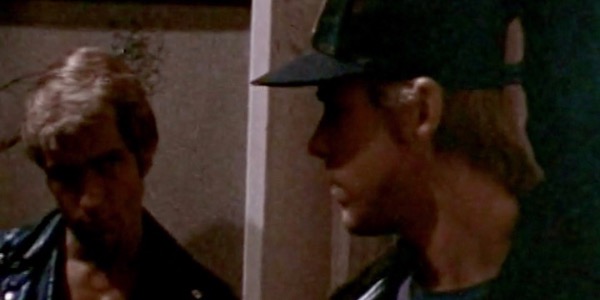BFI Flare 2020: ASK ANY BUDDY & MY FIONA

Alistair is a 25 year old writer based in Cambridge.…
As we are grappling with an unprecedented international medical crisis, the cinematic calendar for 2020 has been turned upside down, and BFI Flare (the LGBTQ sister festival to the main London Film Festival in October) got cancelled just days before it was due to go ahead. Luckily, the BFI team have been pulling out all the stops to give everybody a taste of the festival remotely – curating a special selection of films and Q&A’s on the BFI Player, and giving press a chance to see some of the films that were due to play.
Both me and Becky Kukla were due to attend, and our reviews will appear here as normal – BFI Flare want us to sing the praises of these filmmakers, even if there is no current chance of their films being screened for an audience. So for now, here are two very different recommendations that I hope will be easy to seek out in the not too distant future.
Ask Any Buddy (Evan Purchell)

One of the original Stonewall protest slogans was “We are Everywhere”, a reminder to the homophobic mainstream that LGBTQ people not only existed, but had integrated into modern society all around them. Evan Purchell’s experimental documentary takes that mantra to heart, building up a vibrant view of gay American life in the cities after Stonewall and before the Aids crisis – using only footage from the porn films of the era.
This seems like a provocative experiment on paper, and in practice, it certainly doesn’t hold back from showing the more explicit content (you have been warned: there is fisting). But Ask Any Buddy feels like a genuinely important historical document in spite of this; it may offer a skewed and highly sexualised look at urban life, but it captures many of the underground clubs and cruising spots that no longer exist that were central to the way of life for many a horny gay.
In the age of Grindr, when hookups can be just a tap away for even the most socially awkward guy (ie: me), the film is also a curio when it comes to the depiction of how cruising managed to operate in secret – and as many of these films were produced underground and shown only at designated queer spaces, where many of the stars frequented, there remains an electrifying authenticity to seeing how this could operate in, say, a crowded metro cart, under the glare of many presumably homophobic eyes.
The film is far from perfect though, and that is largely because of its reliance on heavily sexualised excess that doesn’t neatly fit into the film’s thesis. These films offer more of an insight into the wider gay culture of the era than any contemporary viewer would naturally assume – but eventually, it becomes easy to be exhausted by the sheer amount of unsimulated sex acts onscreen, that don’t feel justified in a film highlighting the early representation in the underground. A surprisingly thoughtful experiment then, but one with very clear limitations set by the pre-existing footage used.
My Fiona (Kelly Walker)

Kelly Walker’s directorial debut is a psychological thriller disguised as the archetypal Sundance-friendly comedy-drama, dissecting the messiness of grief while acknowledging that the only ever closure can be accepting the trauma that lies ahead. This trauma is established in the first scene; Jane (Jeanette Maus) is sat with Fiona in the office of their small start-up, fooling around as friends since kindergarten would. Fiona excuses herself and says she’ll be right back – only to die by suicide in the immediate moments that follow.
There is no given explanation for this, no note outlaying her motivations for such drastic action, no sign of any emotional damage in her daily life. After the funeral, Jane agrees to take care of her seven-year-old son Bailey while widow Gemma (Corbin Reid) goes to work, her style of parenting clashing with Gemma’s more strict rules. But it works wonders, and as Jane spends more time at their family house, a relationship blossoms – albeit one in which both parties are imprisoned by their grief and their two very different depictions of the woman they were close to.
This isn’t a particularly original conceit, but Walker manages to ground the inherently melodramatic premise, often feeling like a raw examination of what happens to two people when they forcibly distract themselves from having to cope with their grief. It isn’t particularly subtle either, but the writer/director handles moments that should feel overblown with a certain grace – one moment that has lingered in my mind was a cut to the two women’s arm tattoos, both of which read “Fiona”, while embracing. It felt more psychologically provocative than such a concept had any right to be.
My Fiona is a promising directorial debut from Kelly Walker, the kind of simple but effective character study that I hope manages to find an audience outside of the festival circuit.
Stay tuned to Film Inquiry for more reviews from BFI Flare.
Does content like this matter to you?
Become a Member and support film journalism. Unlock access to all of Film Inquiry`s great articles. Join a community of like-minded readers who are passionate about cinema - get access to our private members Network, give back to independent filmmakers, and more.
Alistair is a 25 year old writer based in Cambridge. He has been writing about film since the start of 2014, and in addition to Film Inquiry, regularly contributes to Gay Essential and The Digital Fix, with additional bylines in Film Stories, the BFI and Vague Visages. Because of his work for Film Inquiry, he is a recognised member of GALECA, the Gay & Lesbian Entertainment Critics' Association.













